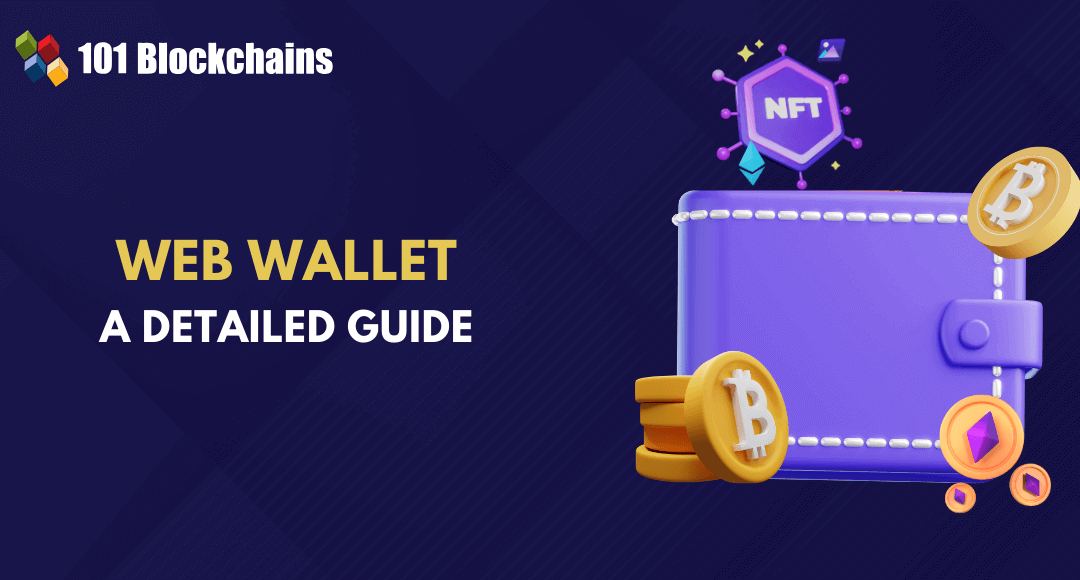Cryptocurrency and digital assets such as NFTs have emerged as prominent attractions in the digital landscape. The technical challenges associated with management of digital assets create the need for tools like web wallets. The curiosity to learn web wallet fundamentals can be attributed to the growing popularity of cryptocurrencies and digital assets. Web wallets offer an easily accessible platform for users to make the most of digital assets. As the name implies, web wallets are a useful resource for managing virtual assets through web applications. You can use web wallets to store the keys to cryptocurrencies of your choice like Ethereum or Bitcoin. Multiple web wallet providers have capitalized on the rising demand of cryptocurrencies to attract users with innovative features. Let us learn more about its significance and how they have revolutionized the cryptocurrency ecosystem in this web wallet guide.
Embrace the technological leap and global adoption that awaits in the upcoming bull run of 2024-2025 with Crypto Bull Run Ready Career Path.
Understanding the Definition of Web Wallet
Web wallet is another way to describe cryptocurrency wallets that hold transaction keys on a website or web application. Virtual assets such as cryptocurrencies work only on decentralized crypto networks for which you must use a web wallet that can interact with the network. Most of the answers to queries like ‘what is web wallet’ create an impression that they store actual cryptocurrencies. On the contrary, web wallets store the keys to the virtual address where you have stored your crypto assets.
You need a web wallet for any type of transaction that involves cryptocurrencies. The most popular examples of web wallets would be crypto exchanges such as Coinbase that offer a basic wallet to store and manage cryptocurrencies. The broadest categories for classification of web wallets include custodial and non-custodial wallets. The distinct functionalities of each type of web wallet depend on the level of control over the ownership and management of your assets in the wallet.
Want to know the answers to some of the commonly asked questions about cryptocurrency? Check the detailed guide on Frequently Asked Questions About Cryptocurrency
Discovering the Usefulness of Web Wallets
The review of most of the examples of web wallets would help you understand the reasons to learn about them. Web wallets are a useful resource to welcome more users to the world of cryptocurrencies and digital assets. Almost every popular web wallet app offers a common set of advantages that garner the attention of users. The foremost advantage of web wallets is the flexibility to interact with cryptocurrencies with easier transactions.
The web wallets that offer the option for self-custody can empower users to take decisions about their cryptocurrencies and digital assets. As new web wallets arrive in the market, users can capitalize on advanced and innovative features. A personal web wallet also has advanced features that strengthen security and prevent exposure to large-scale threats. However, you would have to take the responsibility for security of your crypto assets in self-custody web wallets.
Identify the Limitations of Web Wallets
The most important approach to determine the effectiveness of a technology involves weighing their advantages and setbacks against each other. You must know the limitations of web wallets to ensure that you can use them in the best way for your interests. One of the prominent limitations of web wallets points at the concerns of security due to malicious attack vectors on the internet. The growing complexity of security attacks on web wallets can be a formidable issue for users.
Another prominent aspect in any web wallet guide refers to the concerns of control over the wallet. The web wallet provider has control over your cryptocurrencies and can create restrictions on accessibility according to their choices. You should also note that some web wallets may have complex features that would deter users from accessing cryptocurrencies. It is also important to know that you can lose access to your web wallet if you forget your wallet’s password.
Excited to know the use cases of crypto in NFTs, DeFi, and the metaverse, Enroll now in the Cryptocurrency Fundamentals Course
Recognizing the Threat of Security Risks to Web Wallets
Security is a notable concern for any user who wants to buy or trade cryptocurrencies and digital assets such as NFTs. Web wallets offer an easier way to access digital assets and manage transactions that involve cryptocurrencies. You can notice that security is a trade-off to ensure that cryptocurrencies are adopted in mainstream transactions. The security of web wallets depends on their programming and architecture.
Malicious actors are always on the lookout for vulnerabilities in the security of crypto exchanges and other web wallet platforms. The security of a web wallet app would depend on the security features available with it such as multi-factor authentication and regular updates. The quality of the web wallet may have a crucial role in ensuring the level of security of the wallets. At the same time, you must also note that users can also contribute to the security of web wallets and their digital assets.
Web wallet users must learn about the different security risks of web wallets and the examples of attacks on web wallets. The most troubling and confusing security threat is the risk of social engineering attacks which largely revolve around false promises. Attackers can trick users with emails or links that claim to offer airdrops or rewards and gain access to passwords and other credentials. You should always be careful of any suspected messages or links when you use web wallets.
Is a Web Wallet Really Necessary to Access Cryptocurrencies?
Yes, crypto wallets are essential tools to participate in cryptocurrency transactions. Places which support cryptocurrency transactions require users to pay them through specialized payment apps. The web wallet applications help in sending and receiving payments with ease. You might think about an alternative to web wallets for accessing cryptocurrencies as they have many security concerns.
You may avoid a web wallet by taking your cryptocurrencies off-chain to a hardware wallet. Hardware wallets are devices like USB drives that provide promising advantages in terms of security enhancements. Users must also note that hardware wallets create setbacks in user experience as you cannot gain access to your cryptocurrencies immediately. Web wallets are ultimately the ideal option for any user who wants to send or receive payments with cryptocurrencies and crypto traders.
Comparing Web Wallets with Hardware Wallets
Hardware wallets or cold wallets have been painted as the alternatives to web wallets for the advantages of better security. You can identify a safe crypto wallet only when you know the type of risk you want to protect it against. All types of crypto wallets present different types of risks and also safeguard users against certain risks. The choice of a web wallet would depend on the type and frequency of activity and the risks that you are likely to encounter.
The security level of web wallet examples shows that it is determined by the security of the wallet app. You need web wallets for regular transactions with cryptocurrencies albeit with special attention to the prominent risks. The connection of web wallets to the internet exposes them to various vulnerabilities as compared to hardware wallets.
Users who want to store their cryptocurrencies for longer periods may go for hardware wallets that offer better safeguards against online security threats. On the other hand, you cannot ignore the possibilities of losing the hardware wallet device or private keys. The difference between web wallets and hardware wallets offers a clear explanation for the best way to use web wallets. You can rely on hardware wallets for storing the bulk of your digital assets and web wallets to store the crypto holdings you need for transactions.
Want to get an in-depth understanding of crypto fundamentals, trading and investing strategies? Enroll now in the Crypto Fundamentals, Trading And Investing Course
Important Factors to Consider for Choosing a Web Wallet
The discussion about choosing the right type of wallet between web wallets and hardware wallets ultimately rounds up on critical factors that help in making the decision. You must pay attention to the following factors to adopt the right web wallet.
The most important factor that can guide you to the right web wallet is transaction cost. Any web wallet guide showcases the importance of transaction costs. You should check the transaction charges of web wallets before you pick one for your needs.
You must also pay attention to the list of features offered by the web wallet before using it for crypto transactions. One of the most essential traits that you should look for in web wallets is the support for multiple cryptocurrencies. Another important feature that you should look for in web wallets is the flexibility for integration with hardware wallets.
User experience is also a crucial factor that you must take into account before picking a web wallet. You can browse through different web wallet examples to evaluate their features and take the best pick. Web wallets with appealing user experiences must offer easier navigation and advanced functionalities, especially in terms of security and accessibility.
Start learning about Cryptocurrencies with World’s first Cryptocurrency Skill Path with quality resources tailored by industry experts Now!
Final Thoughts
The web wallet guide showcases that it is an important tool for participating in the crypto landscape. You can learn web wallet functionalities and use them to pay for goods and services with cryptocurrencies or trade crypto assets. As the demand for cryptocurrencies and digital assets continues growing, it is important to understand how web wallets can help users. Learn more about crypto wallets to determine the significance of web wallets in the continuously evolving crypto ecosystem now.

*Disclaimer: The article should not be taken as, and is not intended to provide any investment advice. Claims made in this article do not constitute investment advice and should not be taken as such. 101 Blockchains shall not be responsible for any loss sustained by any person who relies on this article. Do your own research!









